Legend Of Kauravas – Ancient Cloning And Test Tube Babies In India?
Ellen Lloyd - AncientPages.com - In Mahabharata there is a very interesting legend about the Kauravas who were 100 sons of the King of Hastinapur, Dhritarashtra, and his wife Gandhari.
Unless we dismiss the story as pure fiction, the legend of Kauravas raises many thought-provoking questions. How could Gandairi give birth to 100 children on the same day? Why were all 100 babies taken out of their jars all at once?
The event happened 7,000 years ago and the birth of King Hastinapur’s 100 sons is truly unusual to say the least.
Were people in ancient India familiar with cloning and test tube babies? It certainly does sound remarkable, but if true, it wouldn't be the first time we encounter ancient sophisticated knowledge in India that has somehow been “neglected” by modern science.
Legend Of The Kauravas Babies
The legend of the Kauravas babies tells of how once upon a time, a sage came visit Gandhari in Hastinapur, a town in the Indian state of Uttar Pradesh.
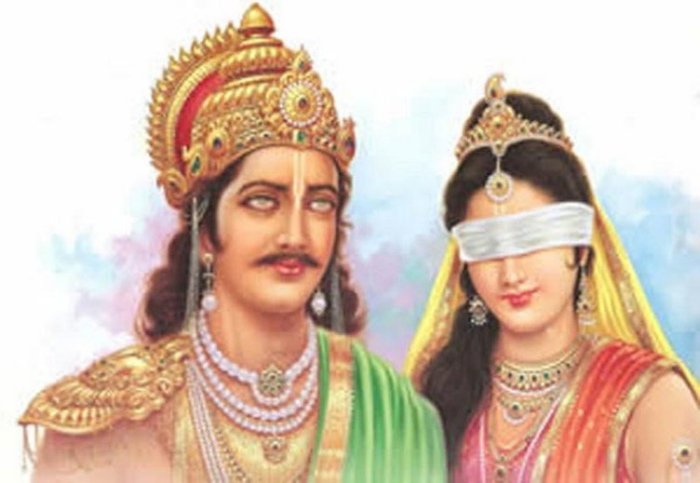
King of Hastinapur, Dhritarashtra, and his wife Gandhari. After Gandhari was married to Dhritarashtra, she wrapped a bandage over her eyes and vowed to share the darkness that her husband lived in. Image credit: The Great Indian Epic
Being a good hostess, Gandhari did all she could to make sure the great sage had a pleasant visit in the town. The saint was content with Gandhari and granted her a favor. Gandhari replied by saying she wished to have 100 sons who would be as powerful as her husband. Vyasa granted her the boon and in due course of time Gandhari found herself to be pregnant.
However, after two years had passed the baby was still not born and instead she gave birth to a hard piece of lifeless flesh.
See also:
Controversial Discovery Of Rama's Bridge - A 1,700,000 Year Old Man-Made Structure
Vimanas – Flying Machines Soaring Through Ancient Sky Of India
Gandhari was devastated and disappointed. Her wish had not been fulfilled and she wanted to throw away the flesh, but Rishi Vyas, a sage who classified the Vedas and is also generally considered the author of the Mahabharata told her that she would indeed but the mother of 100 sons.
Rishi Vyas took the flesh, cut it into one pieces and placed them each in the jars and filled the content with some unknown substance (some say it was oil, others think it was clarified butter). On Gandhari’s request of a daughter, the pieces were cut into 101. When the jars were opened after nine months something very strange happened.
Inside the first jar was a first baby, who was named "Duryodhana", or "the unconquerable one" as well as the one "difficult to fight with". After that all of the jars exploded and thereby giving birth to 100 babies at once. Now Gandhari had one hundred sons and a daughter called Duhsala. All the children grew up to be strong and powerful.
Evidence Of Ancient Cloning?
"No woman can give birth to 100 children in her lifetime, that too all males and of the same age," B G Matapurkar, a surgeon with the Maulana Azad Medical College in New Delhi told a conference organised by the southern chapter of the All India Biotech Association.

Rishi Vyas, a sage who classified the Vedas and is also generally considered the author of the Mahabharata. Image credit. srimadbhagavatam.org
Matapurkar, who holds a US patent on organ regeneration technique that he developed 10 years ago, says he was thrilled when he stumbled upon a verse in the Mahabharata in the chapter titled "Adiparva" that actually describes how the Kauravas were created from a single embryo from Gandhari.
Matapurkar believes that according to the description in the Mahabharata the Kauravas were created by splitting a single embryo into 100 parts and growing each part in a separate kund or container.
If this is true, it means people in India were familiar very advanced science such as cloning in very ancient times.
Mahabharata is filled with many fascinating stories, and this was one of them.
Written by Ellen Lloyd – AncientPages.com
Copyright © AncientPages.com & Ellen Lloyd All rights reserved. This material may not be published, broadcast, rewritten or redistributed in whole or part without the express written permission of AncientPages.com and Ellen Lloyd
About the author:
Ellen Lloyd – is the owner of AncientPages.com and an author who has spent decades researching ancient mysteries, myths, legends and sacred texts, but she is also very interested in astronomy, astrobiology and science in general.
More From Ancient Pages
-
 Ancient Cranial Modification In Peru Led To Social Inequality
Archaeology | Jan 24, 2018
Ancient Cranial Modification In Peru Led To Social Inequality
Archaeology | Jan 24, 2018 -
 Mada’in Saleh: Magnificent Timeless Rock-Cut Tombs And Monuments In The Desert
Civilizations | Oct 30, 2018
Mada’in Saleh: Magnificent Timeless Rock-Cut Tombs And Monuments In The Desert
Civilizations | Oct 30, 2018 -
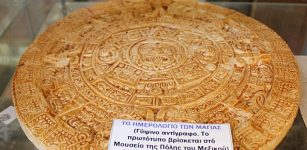 On This Day In History: Mesoamerican Long Count Calendar Begins – On August 11, 3114 B.C
News | Aug 11, 2016
On This Day In History: Mesoamerican Long Count Calendar Begins – On August 11, 3114 B.C
News | Aug 11, 2016 -
 Klerksdorp Spheres – Controversial And Out-Of-Place In Time Metallic Spheres From South Africa
Artifacts | Apr 8, 2017
Klerksdorp Spheres – Controversial And Out-Of-Place In Time Metallic Spheres From South Africa
Artifacts | Apr 8, 2017 -
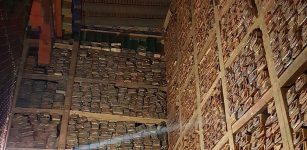 Great Sakya Library Is Home To 84,000 Scrolls Left Untouched For Hundreds Of Years
Featured Stories | Jul 22, 2021
Great Sakya Library Is Home To 84,000 Scrolls Left Untouched For Hundreds Of Years
Featured Stories | Jul 22, 2021 -
 Famous Benin Bronzes Were Made Of German Brass – Study Reveals
Archaeology | Apr 6, 2023
Famous Benin Bronzes Were Made Of German Brass – Study Reveals
Archaeology | Apr 6, 2023 -
 New Interpretation Of A 4,000-Year-Old Cemetery In Present-Day Slovakia
Archaeology | Dec 21, 2022
New Interpretation Of A 4,000-Year-Old Cemetery In Present-Day Slovakia
Archaeology | Dec 21, 2022 -
 Ancient Tomb Of ‘Bird Oracle Markos’ Unearthed In Bergama (Pergamon), Turkey
Archaeology | Sep 6, 2022
Ancient Tomb Of ‘Bird Oracle Markos’ Unearthed In Bergama (Pergamon), Turkey
Archaeology | Sep 6, 2022 -
 A Well-Preserved Lararium Shrine Discovered At Pompeii
Archaeology | Oct 10, 2018
A Well-Preserved Lararium Shrine Discovered At Pompeii
Archaeology | Oct 10, 2018 -
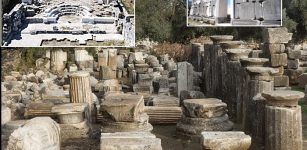 Restorations At Stratonicea Ancient City Of Gladiators In Turkish Muğla Province
Archaeology | May 10, 2023
Restorations At Stratonicea Ancient City Of Gladiators In Turkish Muğla Province
Archaeology | May 10, 2023 -
 Large Mysterious 2,000-Year-Old Structure Discovered At The Center Of A Military Training Area In Israel
Archaeology | Dec 3, 2017
Large Mysterious 2,000-Year-Old Structure Discovered At The Center Of A Military Training Area In Israel
Archaeology | Dec 3, 2017 -
 Birds – Mysterious Avian Messengers That Symbolized Bridge Between Humans And Gods In World Beliefs
Featured Stories | Aug 21, 2021
Birds – Mysterious Avian Messengers That Symbolized Bridge Between Humans And Gods In World Beliefs
Featured Stories | Aug 21, 2021 -
 Evidence Of Ancient Lakes In The Sahara Desert Discovered
Archaeology | Nov 5, 2022
Evidence Of Ancient Lakes In The Sahara Desert Discovered
Archaeology | Nov 5, 2022 -
 Sybil Ludington: Courageous American Girl Who Rode For Independence
Featured Stories | Dec 19, 2020
Sybil Ludington: Courageous American Girl Who Rode For Independence
Featured Stories | Dec 19, 2020 -
 Long-Lost Wreck Of Crusader Ship And Gold Coins Discovered
Archaeology | Mar 14, 2017
Long-Lost Wreck Of Crusader Ship And Gold Coins Discovered
Archaeology | Mar 14, 2017 -
 Mesoamerican Rubber Ball Game Tradition Existed Earlier Than Thought
Ancient Traditions And Customs | Mar 17, 2020
Mesoamerican Rubber Ball Game Tradition Existed Earlier Than Thought
Ancient Traditions And Customs | Mar 17, 2020 -
 Silla: The Most Successful Of Three Korean Kingdoms
Featured Stories | Aug 22, 2023
Silla: The Most Successful Of Three Korean Kingdoms
Featured Stories | Aug 22, 2023 -
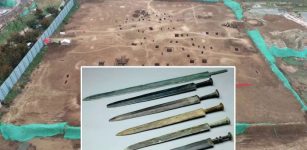 Well-Preserved Warring States Period Swords And Cultural Relics Discovered In Xiangyang, Hubei
Archaeology | Apr 5, 2024
Well-Preserved Warring States Period Swords And Cultural Relics Discovered In Xiangyang, Hubei
Archaeology | Apr 5, 2024 -
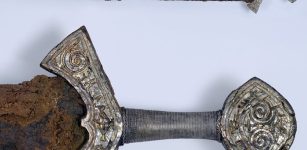 Mystery Of The Langeid Viking Sword And Its Undeciphered ‘Magical’ Inscriptions
Artifacts | Jun 4, 2022
Mystery Of The Langeid Viking Sword And Its Undeciphered ‘Magical’ Inscriptions
Artifacts | Jun 4, 2022 -
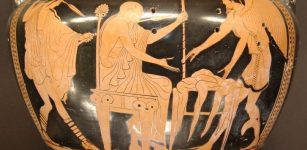 Prophet King Phineus Revealed The Future To Humans And Unleashed God Zeus’ Fury
Featured Stories | Nov 20, 2019
Prophet King Phineus Revealed The Future To Humans And Unleashed God Zeus’ Fury
Featured Stories | Nov 20, 2019

